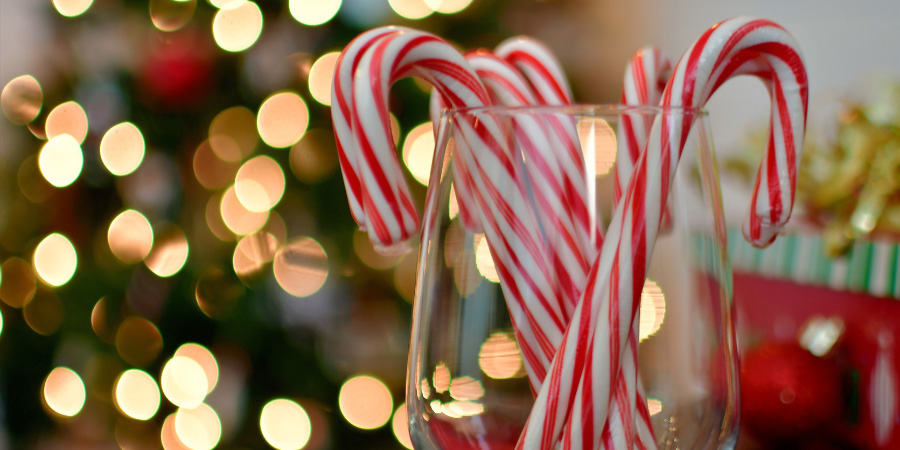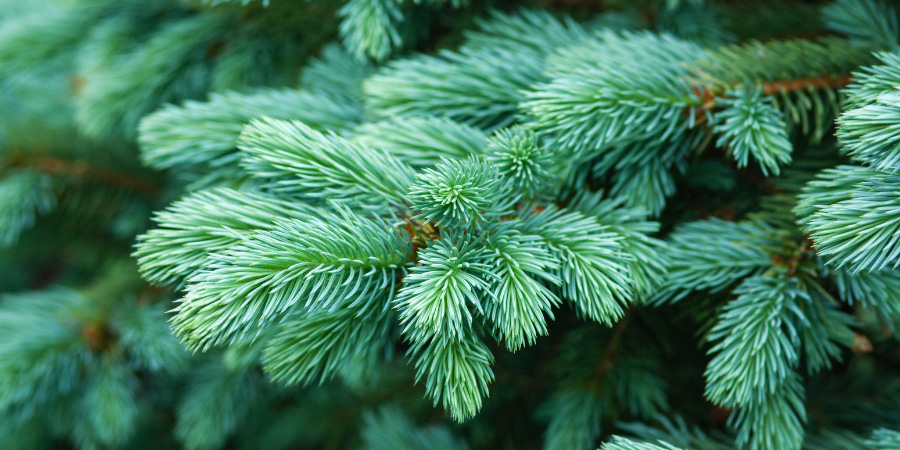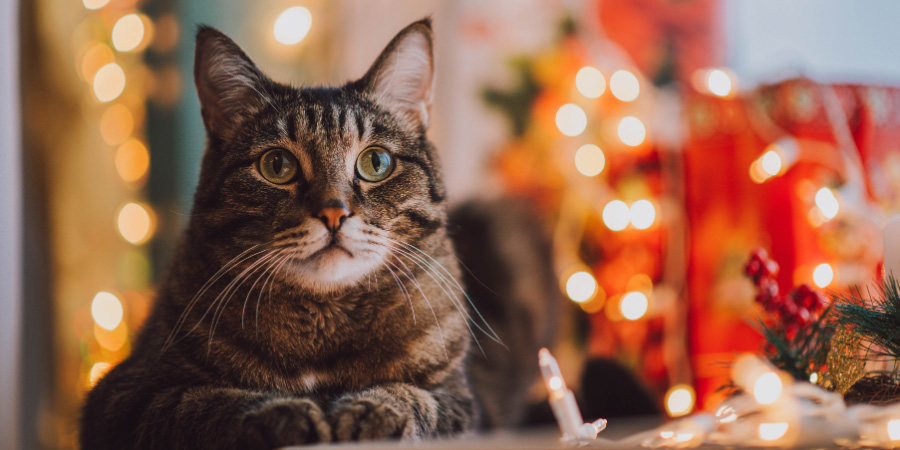But have you considered if your home will still be safe for your pet?
From edible decorations to the oils produced by real Christmas trees, many things could harm your pet and force them into a life-threatening situation. And, as most pets are curious and won’t waste any time exploring all the new items that suddenly appear, owners must think ahead and be aware of any potential dangers before decorating.
Fortunately, our blog gives you the information and expert guidance to ensure your home is merry and bright but still safe for our pals with paws!
Decorations

Despite their festive charm, some of our favourite Christmas decorations could put our pets at risk of serious illness or even death. Before decorating, determine which decorations are harmful to your pet – this will help ensure a safe home for them during the festive season.
Artificial snow: HAZARDOUS
Manufacturers in the UK typically produce artificial snow using ingredients that have low risks of toxicity in pets. However, some artificial snow decorations imported from outside the UK can be toxic due to the different safety standards in other countries. As a pet owner, it’s important that you understand exactly what you are buying and the potential risks so you can best protect your pet.
If eaten in small quantities, artificial snow could cause your pet to develop a mild stomach upset – symptoms include excess drooling, vomiting, or diarrhoea. Fortunately, eating a little artificial snow shouldn't cause your pet any serious or lasting problems, and they should feel better in a few days.
However, if your pet eats a large amount of artificial snow, a build-up could form in their stomach, leading to a blockage. If you think your pet has eaten a lot of artificial snow or is showing signs of becoming unwell, you should contact your vet straightaway for advice.
Tinsel: HAZARDOUS
Ideally, pet owners should skip on the tinsel as curious pets may mistake it for a shiny new toy and won’t hesitate to get their paws on it. And by doing so, the consequences can be deadly.
Although tinsel is not poisonous, it’s a choking hazard and can cause serious injury or death if swallowed. This is because it can get stuck as it tries to pass through the intestines and cause a deadly blockage – a life-threatening situation that would require emergency surgery.
If you know your pet has eaten tinsel or is showing signs they may have swallowed something they’re not supposed to (such as vomiting, diarrhoea, refusing to eat, or lack of energy), contact your vet immediately. Mistaking symptoms for a simple stomach bug and not speaking with a vet as soon as possible could be the difference between life and death, so it’s always important to involve your vet as soon as you notice a change in your pet.
Read Dexter’s story: PDSA Vets saved Dexter after pulling THREE FEET of tinsel from his stomach
Ornaments, baubles, and lights: HAZARDOUS
Baubles are generally low toxicity to dogs. If your pet eats them, however, they can get stuck in the throat and cause an obstruction, which could stop them from breathing. They can also cause problems in the stomach and intestines.
If knocked to the floor, glass ornaments and baubles will shatter and injure your pet should they stand on any broken pieces. To avoid accidents, use unbreakable plastic ornaments. Place them higher on the tree to keep them out of the way of wagging tails or playful paws.
Be aware that lights could also be a potential problem for pets due to the risk of electric shocks from higher-voltage lights!
Edible tree decorations: TOXIC
Ideally, edible tree decorations made from chocolate should be avoided entirely in homes with pets due to the risk of chocolate poisoning. Chocolate contains theobromine, an ingredient which causes damage to the nervous system in cats and dogs and can be fatal. Different types of chocolate contain varying amounts of theobromine, but any chocolate can potentially harm pets, so keeping it entirely out of their reach is important.
Watch out for sugar-free or low-sugar candy canes or other sweet decorations, as they may contain xylitol (sometimes called birch sugar – a common sugar substitute which is highly toxic to dogs). Levels of xylitol can vary from product to product, but a small amount is enough to seriously harm your four-legged friend.
If you decide to dress the tree with edible decorations, hang them towards the very top, so they’re out of the way and more difficult for your pet to get hold of. If you suspect they have eaten chocolate or anything containing xylitol, take them to the vets immediately. The quicker they are treated, the better the chance of a good outcome!
Read Ghost’s story: Pup nearly dies after wolfing down 24 chocolates
Real Christmas trees

Pet owners must also be aware of the potential dangers of a real Christmas tree at this time of year, as swallowing the branches, needles, or water in the tree stand can cause your pet to become ill. In general, artificial trees are safer for our pets. However, there is still a risk of your dog knocking it over or your cat climbing it and causing injury to themselves. To avoid accidents, secure your tree (whether real or artificial) in a sturdy base.
Christmas tree needles: HAZARDOUS
If your pet brushes past a real Christmas tree (pine, fir, or spruce), there’s usually no cause for concern, as the needles themselves aren’t toxic. However, they can still cause serious harm, especially if your pet swallows them or if they come into contact with the eyes.
If your four-legged friend decides to snack on the needles from a real Christmas tree, they may become ill from an upset stomach and an irritated mouth. They could also get stuck in a cat’s soft palate, causing irritation or trauma to the intestines due to their sharpness.
For your pet’s safety, keep them away from the Christmas tree so they can’t snoop around for an unusual snack. Also, remove any needles that fall to the floor by vacuuming regularly.
Christmas tree water: TOXIC and HAZARDOUS
If you have a real tree, do not add chemicals, fertilisers, or preservatives to the water, as many of these are toxic to pets. But even without anything added, be aware that stagnant water is still a breeding ground for harmful bacteria and could cause an upset stomach if your pet decides to drink it.
Curious cats may be tempted to drink from the Christmas tree pot. To prevent this, keep them away from the room where the tree is located. If restricting access isn’t possible, consider covering the water pot with netting or a tree skirt to stop them from drinking from the water supply. Always ensure they always have access to clean, fresh water too.
Christmas tree sap/oil: TOXIC
The oils from the needles of real trees are what give us that classic Christmassy scent that we know and love. Sadly, these oils are toxic to pets, and ingestion can lead to illness, liver damage, or death.
When a pet ingests small amounts of a tree’s sap by chewing on branches and needles, it can cause unpleasant side effects such as unusual breathing, vomiting, and diarrhoea. Swallowing a large amount can seriously affect their kidney or liver functions, which can be fatal. Contact your vet immediately if you think your pet may have eaten any liquid or oils from the branches.
Prevention is better than cure this Christmas

Keep an extra close eye on your pet during the festive period – especially new puppies or kittens who have never experienced Christmas (and everything that comes with it!) before.
Ensure they don’t sneak off to eat anything they shouldn’t, and keep all dangerous items – including all toxic foods, drinks, plants, and household cleaners – entirely out of their reach. If possible, restrict their access to the room(s) where the Christmas tree or any hazardous festive décor can be found.
Read next: Keeping pets calm and happy at Christmas
